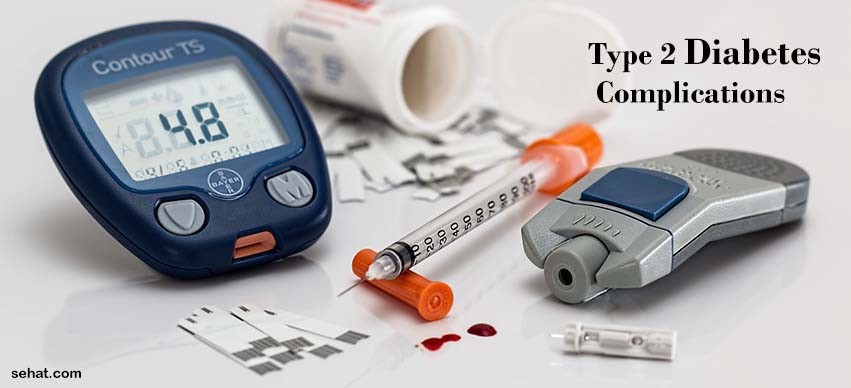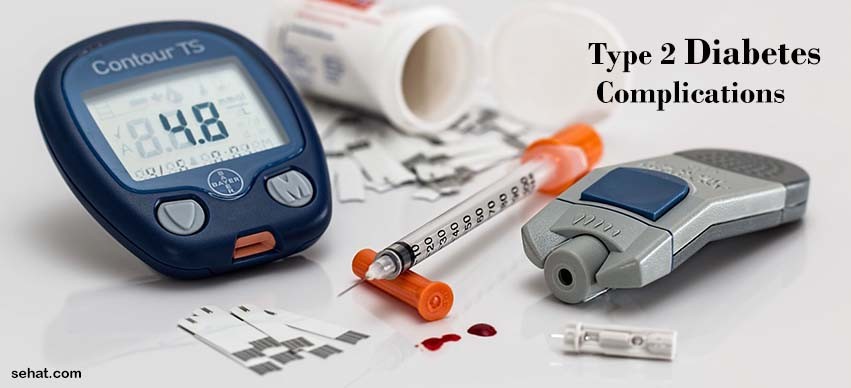Nanoparticle Therapy – An Emerging Cancer Treatment
5 Min Read


'Diabetes' is a terrifying word - terrifying enough to send a chill down one's spine, for even the bravest of the brave are afraid of this life-threatening and life-modifying disease. What is it about this disease that makes everyone stand in dread of it?
Diabetes is a disease that can lead to a range of serious complications, and so it is important for us to understand everything about type 2 diabetes complications and how to keep diabetes in control. Diabetes is called a silent killer as complications arise one by one and take you onto the brink of death.
But before we go ahead let's be clear about one thing - just because a person suffers from diabetes, it doesn’t mean that he or she will lose his or her sight or kidneys. You can definitely control diabetes and get back your original quality of life. Once you are able to bring your diabetes in control, the above symptoms will disappear. You can also control diabetes by following a proper diet.
The most important thing is to be aware of the risks involved when diabetes isn’t controlled and, therefore, make regular visits to your doctor to keep your diabetes in check. Diabetes, when not controlled, can lead to tissue damage throughout the body.
Take a look at some of the most common diabetic complications
Diabetic eye disease is something serious and if you have diabetes, it is essential that you visit your ophthalmologist regularly to avoid eye problems. You have to ask yourself the question, "How does diabetes affect the eyes?" High sugar levels in the blood may cause blurred vision, which is normally a temporary phase and can be corrected when the high sugar levels come down. But, it should be remembered that diabetes could even lead to serious vision problems such as cataracts, glaucoma, or diabetic retinopathy, which may even cause total blindness.
Diabetes can lead to Diabetic Neuropathy or nerve damage that can cause pain or numbness in your hands and feet. Diabetic neuropathy is a type of nerve damage that occurs if you have diabetes. High blood sugar levels can damage nerve fibers throughout the body, but diabetic neuropathy mostly damages nerves in the legs and feet. Diabetic neuropathy can be divided into peripheral, autonomic, proximal, and focal neuropathy. Symptoms can include tingling, numbness, burning, or pain.
If you have diabetes, you may also develop vascular diseases that have been linked to diabetes. One of the most important of these is retinopathy, which is the abnormal growth of blood vessels in the retina of your eye. Another condition that is linked to diabetes is a disease of the kidney called Nephropathy. You are also likely to experience hardening of the arteries, high cholesterol, high blood pressure, and coronary heart disease. The only way to prevent these vascular problems is by keeping your sugar level in check. Managing your diabetes is extremely essential or it could lead to serious health conditions.
People, who have diabetes, are twice more likely to have heart disease or suffer a stroke than non-diabetics. People with diabetes also tend to develop heart disease or suffer strokes at an earlier age than other people. Many people with diabetes have other conditions that increase their chance of developing heart disease and stroke. People with diabetes are at risk from Coronary artery disease where these arteries get narrowed down due to the deposit of plaque. These deposits may affect blood flow, increasing the chance of clogging and hardening of blood vessels - a condition called Atherosclerosis. Diabetics are also prone to Congestive heart failure where the heart loses the ability to pump blood effectively. People with diabetes who have already had one heart attack run an even greater risk of having a second attack.
Kidney failure is another most common complication that affects nearly 44% of diabetics leading to chronic kidney disease. In severe cases, people with kidney failure have to undergo dialysis regularly or undergo kidney transplantation to receive a healthy kidney from a donor. In diabetes, the small blood vessels in the body are injured and therefore, the kidneys cannot function properly, resulting in a waste material build up in the blood. Diabetes also may cause damage to nerves in your body and cause difficulty in emptying your bladder. The pressure resulting from a full bladder can back up and injure the kidneys.
People suffering from diabetes are likely to suffer from high blood pressure and other heart and circulation problems. You will find that people with high blood pressure suffer from damaged arteries leading to their hardening called atherosclerosis. Atherosclerosis can cause high blood pressure, which if not treated promptly, can lead to blood vessel damage, stroke, heart failure, heart attack, or kidney failure.
A stroke is an outcome when the blood supply to any part of your brain is suddenly interrupted resulting in damage to brain tissue. Most strokes happen because a blood clot blocks blood vessels in the brain or neck. It can cause problems of movement, thinking, speaking, and also cause pain and numbness.

Urinary Tract infection is a bacterial infection that grows within the urinary tract - anywhere from the kidneys, the ureters, the bladder and through to the urethra. Urinary Tract infections and diabetes are connected as UTI can be found particularly in people with diabetes, as sugar in the urine makes a fertile breeding ground for bacteria. Vaginal candidiasis and vascular disease also play a major role in recurrent infections. There are two types of Urinary Tract infections - Upper Urinary Tract infection and Lower Urinary Tract Infection, but Upper Urinary Tract infection is more serious.
People who suffer from diabetes need to take great efforts to control their diabetes so that their blood sugar levels never get too high or too low. They must carefully monitor the medicine that they take, the food that they eat, and the amount of exercise that they do. When diabetes is left uncontrolled it can lead to memory loss. We need a constant supply of glucose to the brain to maintain normal brain functioning. When a diabetic person becomes hyperglycemic (too much glucose) or hypoglycemic (too little glucose), the brain functioning suffers.

Uncontrolled diabetes can cause damage to your nerves, and if you have damaged nerves in your legs and feet, you might not feel heat, cold, or pain, or any sensation. This condition is called Sensory Diabetic Neuropathy and can lead to diabetic foot complications. When diabetes is not controlled effectively, the organs will be damaged and impair the immune system. The muscles of the foot may not function properly, because the nerves that make the muscles work are damaged. Diabetes also affects blood flow, and without proper blood flow, it takes longer for a wound or cut to heal. Poor blood circulation in the arms and legs is called Peripheral Vascular Disease.
People with uncontrolled diabetes are more prone to dental problems as gum disease and diabetes are inter-related. They are more likely to have infections of their gums and the bones that hold the teeth in place, because of reduced blood supply to the gums. High blood sugar can also cause dry mouth and worsen gum disease. Decreased saliva can increase the process of tooth-decay and plaque buildup. Do take good care of your gums and teeth and keep your diabetes in control to prevent dental problems.
Depression not only affects the brain but it also affects your entire body. Depression and other health problems, including diabetes, are interlinked. Depression is a serious mental illness, which interferes with your daily life and the quality of your life. Psychotherapy, with the help of a well-trained therapist, can help solve the problems of depression.